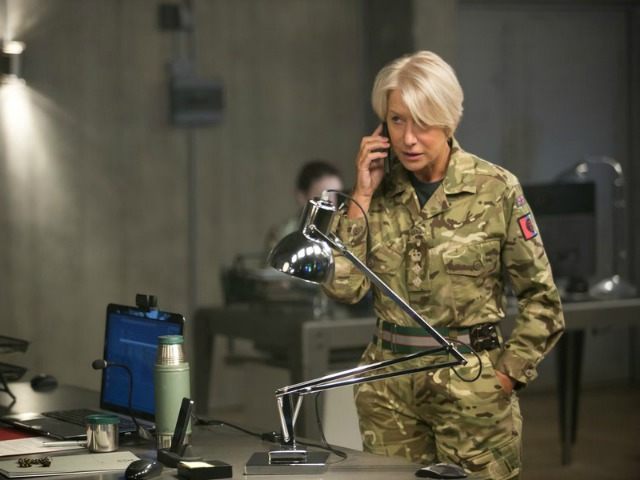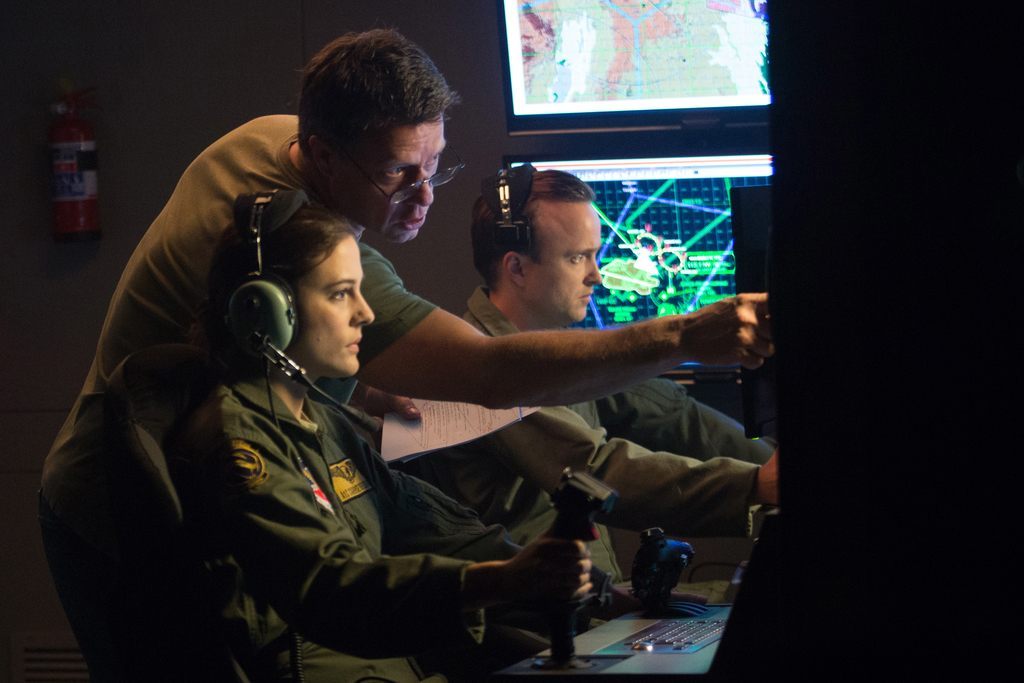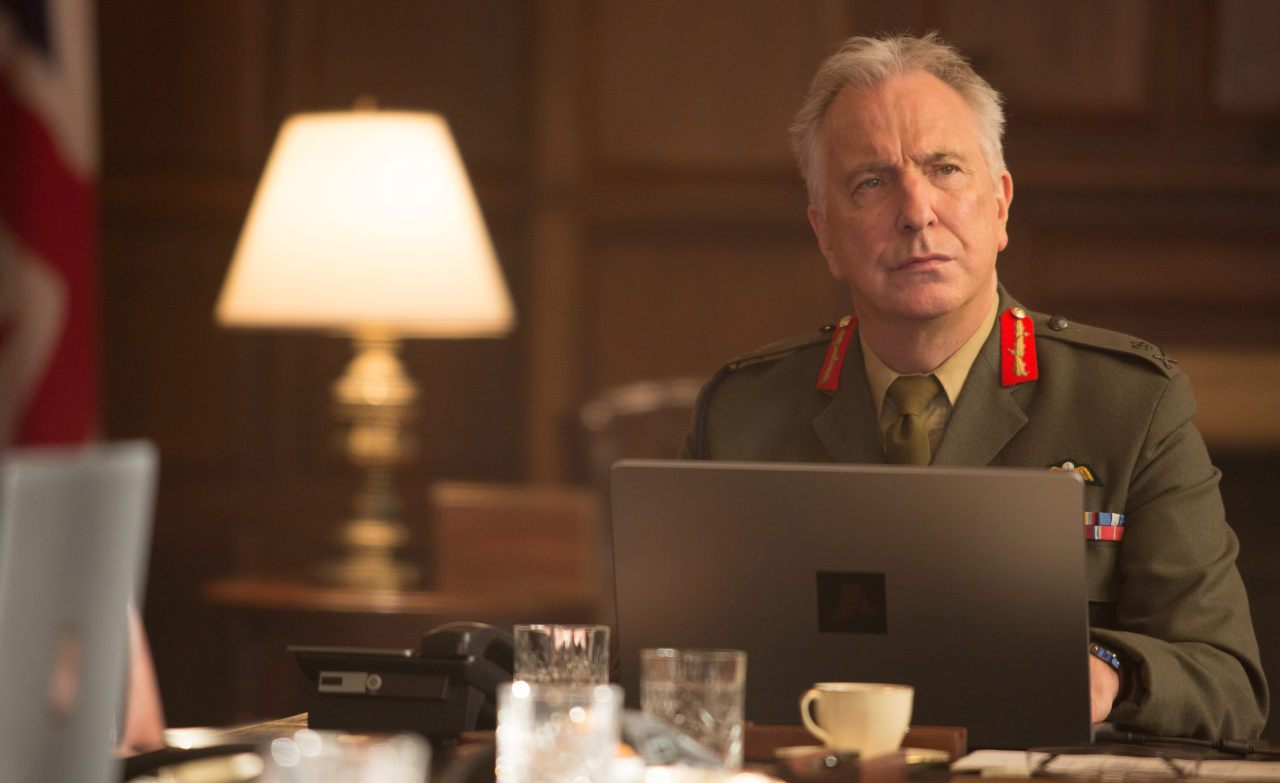Eye in the Sky is a challenging film about a highly contentious subject: the ethics and morality of targeted drone warfare.
In fact, the whole film is a kind of meditation on the lengths to which sovereign nations will go in order to keep their citizens safe — and it presents no easy answers, even after the white-knuckle thrills end with the film’s closing frame.
Oscar-winner Helen Mirren is UK-based drone operation commander Col. Katherine Powell, who, after six years of patient waiting, has finally cornered the radicalized British terrorist Susan Danford (Lex King), a.k.a Ayesha Al-Hady, in the slums of Nairobi, Kenya.
The only problem: the safe house where Danford is located has two other occupants, Somali terrorists who are strapping on explosive-filled suicide vests with the intention of blowing themselves up in a crowded place.
The mission quickly changes from “capture” to “kill,” as a nervous Lt. Gen. Frank Benson (a brilliant Alan Rickman, in his last role before his untimely death in January) attempts to square the new order with his superiors, including the Prime Minister. Powell gets the go-ahead and orders a Hellfire missile strike against the terrorists’ hiding place.
But everything changes as American drone operator Steve Watts (Emmy-winning Breaking Bad star Aaron Paul) spots a little girl selling bread just inside the collateral damage area of the proposed drone strike. An operative on the ground (Oscar nominee Barkhad Abdi) in Kenya does what he can to save the girl, but it may not be enough. With time running out for a successful strike, Powell, Watts and Benson must grapple with the political, legal and moral implications of taking a life with the hopes of saving many more.
The script, by BAFTA Award-winner Guy Hibbert (Five Minutes of Heaven) almost goes out of its way to refuse to take a side on the issue. That is one of the reasons South African director Gavin Hood (X-Men Origins: Wolverine, Ender’s Game) was so attracted to the project.
“I like that the script didn’t tell me what to think,” Hood tells Breitbart News in an interview. “It didn’t preach to me. It presented enough points of view for me to actually struggle with what I thought and allowed me to think for myself, with a little more information about drone warfare than I had before I went in.”
Hood said he consulted dozens of experts while prepping the film, including military officers, intelligence officials, drone pilots, and terror investigators, with the hopes of coming at the project “from multiple points of view.”
“Warfare used to be about conflict between military powers battling for territory. Now it’s about people battling for ideological domination, in a world where it’s less about combat and more about hunting one another,” says Hood. “It’s kind of creepy.”
Breitbart News caught up with the director for a brief interview ahead of the film’s opening this weekend. The following interview has been slightly condensed for readability but has not otherwise been edited.
(Left to right:) Actress Phoebe Fox, director Gavin Hood and actor Aaron Paul on the set of Eye in the Sky, a Bleecker Street release. Credit: Keith Bernstein/Bleecker Street
BN: There are so many thing I want to ask about the film, but I really don’t want to spoil the ending for our readers. I know the film doesn’t make a point one way or the other about the efficacy of using targeted drone strikes… Do you personally believe in the morality of drone warfare?
Gavin Hood: That’s a very interesting question. Drones are just a new way of waging warfare. It’s a new weapon; the question is, how do you use the weapon? It’s like saying, “Do you believe in the morality of missile warfare? Do you believe in the morality of 9mm Baretta warfare?” These are weapons. And weapons can be used in different ways.
I’ll ask a question of you: Given what happened in California recently, with two extremist radicals shooting a bunch of people — imagine if those folks were the same as the people in our movie strapping on suicide vests. Do you support the idea of continued armed drone surveillance over California and Los Angeles, with the right to launch a Hellfire missile and acceptable levels of collateral damage?
The answer is, we kind of do that with SWAT teams. This is a new weapon, you’re sending a new “SWAT team” in. The real question for us is, to what extent — and this is a national debate, I honestly don’t know if I’ve made up my mind — to what extent are we willing to be continuously watched by weaponized drones in order to protect us from possible events? And to what extent do we feel threatened by that extreme level of security?
And there’s no good answer. Anybody who tries to give you an easy answer is being slightly glib, I think. I hope what the film does is encourage people with different points of view to engage in a meaningful debate, because so much of our politics now is positional bargaining. “This is what I think, and you’re wrong,” as opposed to, ‘This is my perspective based on my experience. What’s yours?’
If I have a point of view, it’s this: let us stop taking easy, quick positions on these difficult matters and let us really examine them with humility and the understanding that human life is involved.
We live in a world where the battle for ideas is as important, if not more important, than the physical battles involving weapons like drones. The rules of war as we’ve known them are kind of going out the window. Warfare used to be about conflict between military powers battling for territory. Now it’s about people battling for ideological domination, in a world where it’s less about combat and more about hunting one another. It’s kind of creepy. We get hunted in our own cities. We don’t fight them over there or meet on the battlefield; the battlefield has become the globe, and part of that battle is recruitment. How do we recruit more folks to our point of view than they recruit to theirs?
https://www.youtube.com/watch?v=kksqu10Wq-8
BN: One of my favorite things about the movie is that the suspense doesn’t come from endless sequences of explosions and elaborate action pieces. It’s really a slow burn of tension through the whole movie. You have this whole bureaucratic nightmare running parallel with the actual drone sequences.
But there’s a certain dark comedy that comes through, with all these hapless high-level military guys having to “refer up” for every decision. Were you mindful of that kind of bleak comedy while you were making the movie?
GH: We intended the humor. It was a very fine line, because I wanted people to be able to release that tension you described. Just as in real life, there are moments when things feel so frustrating that you either laugh or yell or cry, cause it’s just too much. You know, “Are we really in this situation? You’ve got to be kidding me!” And so the opportunity for the audience to laugh is a great way of releasing tension so that you can ratchet them up again.
I told the actors, “We’re on a fine line here. Don’t try to play broad comedy, we can’t do that. Play the truth of what your character would feel in this situation.” Which is legitimate frustration, or, in the case of the minister — who the audience wants to make a decision, you know,’For God’s sake, make the decision!’ — well, that’s great, unless you’re him. Because none of us really want to have blood on our hands even if it might be in that moment the right thing to do. It’s a heck of a thing to ask someone, especially someone who’s not in the military, who doesn’t do it every day, to decide to take human life.
So at the same time that we’re annoyed with him for not making a quick decision, if we’re honest, if we’re in his shoes, we might also be going, “Isn’t there someone else who should make this decision?” And yet that’s funny. It’s funny because in some way we’re relieved that that’s not us.
BH: Do you think the film is an accurate representation of the decision-making process around drone strike orders at the highest levels of government?
GH: Not every drone strike is referred all the way up through politicians to the Foreign Secretary. It depends on where the area of combat is. So if you’re in combat over Afghanistan or over Iraq or fighting ISIS, the rules of engagement for those particular areas that are defined already as combat zones are clear that you would refer up to a regional commander, for example; you almost certainly wouldn’t need to go higher for authority to strike — unless, as in the case of the strike on Anwar al-Awlaki in Yemen, it’s an American citizen, in which case it went higher.
In this particular scenario — Guy [Hibbert] deliberately sketched a scenario where the country in which the terrorists are located is not a country with whom we are already at war and where there’s already a defined combat zone. The people being targeted are recruits from the United States and Great Britain.
When we made the film, the British had not yet targeted any of their own citizens. In September last year, they did, in Syria. They killed two Brits with a drone strike. So in some sense, the film was ahead, but now the reality is ahead of the film. So this was a tricky thing, because we made the film and we knew things were moving in that direction, but exactly what would happen we didn’t know.
(Alan Rickman stars as Lt. General Frank Benson in Gavin Hood’s Eye in the Sky, a Bleecker Street release. Credit: Keith Bernstein/Bleecker Street)
BH: The cast is full of award-winning actors — Helen Mirren, Alan Rickman, Aaron Paul, Barkhad Abdi. Unfortunately, Rickman passed away shortly after completing the film, making Eye in the Sky his last live-action film (he voices the Blue Caterpillar in Alice Through the Looking Glass later this year). What was it like to work with him?
GH: It’s awkward, because I had no idea this would be Alan’s last film, and I feel somewhat… awkward that it is, because truthfully, Alan was so articulate and so intelligent and would have been a great guy for you to talk to, because he understood the themes and the complexities of the arguments involved. He was a wonderful man to speak to, he was a great actor, a super-intelligent person, wonderfully compassionate, open to talking about the ideas in the film from multiple points of view. He would have been an extremely wonderful person to be sitting here with today having these interviews. I’m very, very saddened that he’s not here to do that.
It was a huge shock to all of us. At the same time, I’m so thankful that he’s in the movie, because he does exactly what we were talking about. He manages to bring a truthfulness to the role and find those moments of humor, without in any way jumping us out of the movie and turning it into a comedy. He was a consummate actor in the sense that he knew how to play absolute emotional truths and find honest moments to make the audience both laugh and cry.
BH: What’s next for Gavin Hood?
GH: (laughing) I don’t know. This film’s been so all-consuming and fascinating… so I’m just talking to you and folks who might like the movie, and hopefully encourage others to go see it. Movies like this that aren’t ‘goodies versus baddies’ are not always easy to get out there, but hopefully when people see it they’ll feel they got a good ride as a thriller and actually come away with something to talk about. As for me, we’ll see what happens.
Eye in the Sky opens in select theaters March 11.



COMMENTS
Please let us know if you're having issues with commenting.